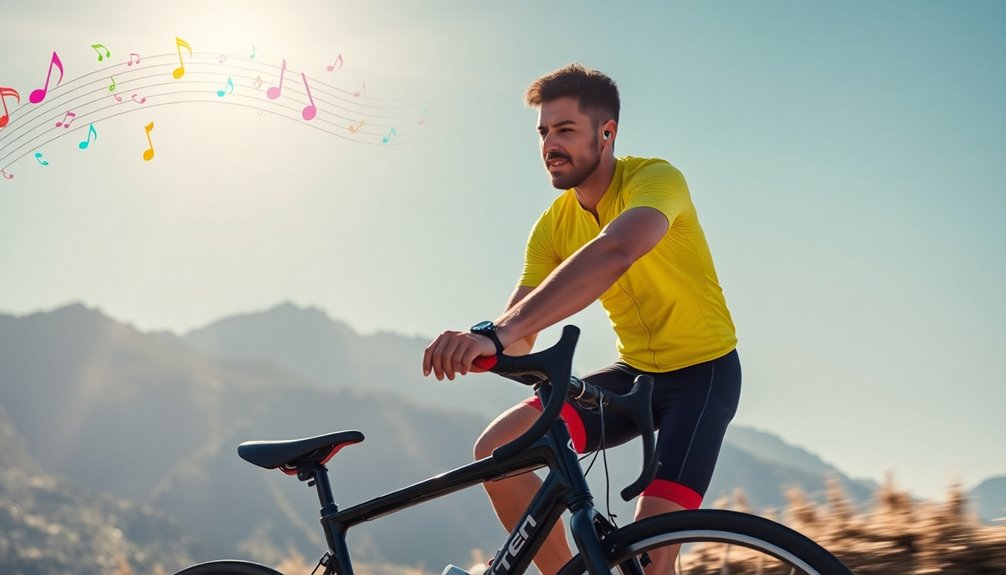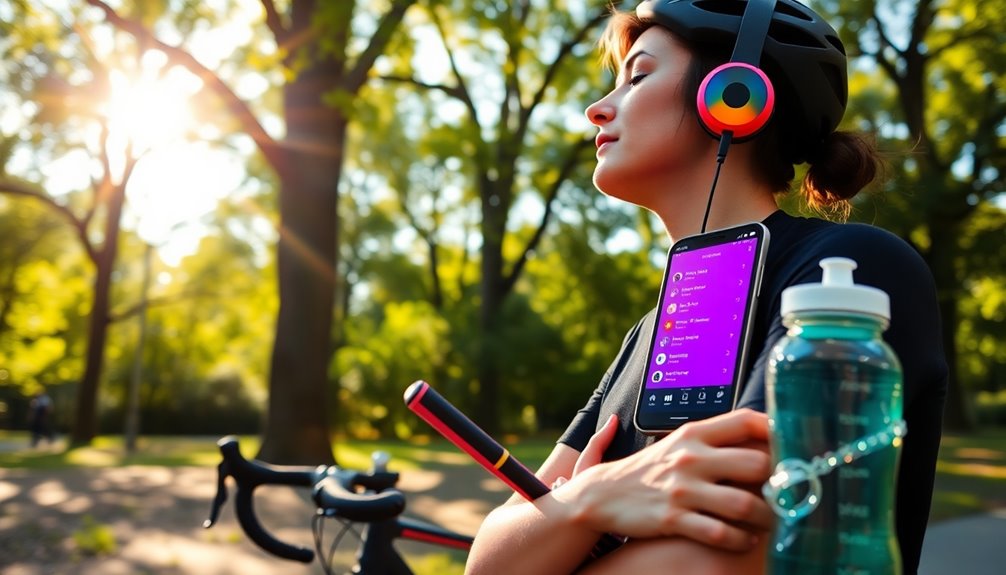Music enhances your cycling experience by acting as a powerful distraction, lowering your perceived exertion, and helping you push through fatigue. It boosts your mood, elevates your motivation, and transforms your feelings on the bike. The right tempo can improve your endurance and speed, while rhythmic elements help maintain focus. Plus, upbeat tracks get your heart racing and calm tunes ease pre-ride jitters. Discover how the right playlist can elevate your ride even further.
Key Takeaways
- Music serves as a powerful distraction, lowering perceived exertion and allowing for longer, faster cycling sessions.
- Upbeat tracks elevate mood and motivation, enhancing overall enjoyment and emotional connection during rides.
- Fast-paced music improves endurance and speed, potentially increasing performance by up to 20%.
- Auditory cues from music help maintain cadence and rhythm, enhancing muscle memory and cycling efficiency.
- A mix of energetic and calming tunes can ease pre-event nerves while preparing the body for competition.
Distraction

While you might think of music as just background noise, it can actually serve as a powerful distraction during your cycling sessions. When you listen to your favorite tunes, you'll find that they greatly divert your attention away from pain and fatigue, making those long rides much more enjoyable.
Music effectively lowers your Rate of Perceived Exertion, allowing you to pedal faster and longer without feeling as strained. At an endurance pace, it blocks brain signals related to discomfort, enhancing your overall experience.
Even during high-intensity efforts, the rhythmic elements of music can help you maintain focus and concentration, reducing the perceived effort. So, crank up those tunes and let the distraction take you further than you thought possible.
Mood Management

When you incorporate music into your cycling routine, you can greatly enhance your mood and overall enjoyment of the ride. Listening to music can improve your serotonin levels, making you feel happier and more motivated.
The right tunes can evoke specific emotions, whether you want to feel calm or energized, which positively influences your cycling experience. Studies show that people report more positive feelings after workouts when music is part of the mix.
Plus, music serves as a motivational tool, connecting you to inspiring moments that lift your spirits. Regardless of your music preferences, integrating it into your cycling sessions can transform how you feel, helping you enjoy every pedal stroke even more. Additionally, intrinsic motivation plays a crucial role in sustaining your energy and enjoyment during longer rides.
Enhancing Physical Performance

Music plays an essential role in enhancing your physical performance during cycling. With a tempo of 125-140 beats per minute, fast-paced tracks can improve your endurance and speed on low-to-moderate intensity rides. Studies show that syncing your pedal strokes to music can boost your endurance by 20%, making your exercise performance more efficient. Plus, music increases cardiac output and oxygen consumption, leading to better overall performance. According to Dr. Costas Karageorghis, incorporating music can enhance cycling endurance by about 15%.
| Tempo (BPM) | Endurance Gain | Performance Impact |
|---|---|---|
| 125 | 15% | Increased Speed |
| 130 | 20% | Efficient Pedal Stroke |
| 135 | 20% | Reduced Fatigue |
| 140 | 15% | Improved Cardiac Output |
| 145 | 15% | Enhanced Stamina |
Learning a Skill/Sequence

To master cycling skills and sequences effectively, incorporating music into your practice can be a game changer. Music while exercising provides crucial auditory cues that help you maintain proper cadence and rhythm, which is essential for executing learned techniques on your rides.
After you grasp theoretical concepts, integrating high-tempo music, ideally between 120-140 beats per minute, can greatly improve performance. This upbeat tempo encourages you to keep a steady pedal stroke and avoids inefficient gear grinding.
Additionally, synchronizing your cycling movements to the music creates a rhythmic foundation, enhancing muscle memory. By using music as a cue during practice, you reinforce the connection between auditory signals and your physical skills, making it easier to master and repeat techniques effectively. Moreover, incorporating regular breaks during practice sessions can help maintain energy levels and prevent fatigue.
Pre-Event Preparation

As you gear up for your cycling event, the right music can kickstart your heart rate and get you physically ready to race.
Pairing upbeat tracks with calming tunes can also help ease your pre-event nerves, keeping you focused.
Heart Rate Activation
There's something about upbeat tunes that can really get your heart pumping before a cycling event. As you gear up, aim for tracks with a tempo of 120 to 140 beats per minute; these high-intensity rhythms can greatly elevate your heart rate, priming you for the ride ahead.
| Beats Per Minute | Effect on Heart Rate | Suggested Genres |
|---|---|---|
| 120 | Moderate Increase | Pop, Dance |
| 130 | High Intensity | Electronic |
| 140 | Peak Activation | Rock, Hip-Hop |
Moreover, motivational lyrics can boost your mindset, while music tied to your team's identity fosters camaraderie, making you feel more united and ready to conquer the challenge.
Nerve Reduction Techniques
While high-energy tracks can pump you up before a ride, finding a balance with calming music can be just as beneficial for your pre-event preparation. Music can be used to reduce pre-event nerves and promote relaxation, helping you achieve a more focused mindset.
Incorporating soft melodies can ease anxiety, while upbeat songs can elevate your heart rate and readiness for competition. The benefits of music extend beyond motivation; lyrics in encouraging songs offer inspiration, mentally preparing you for challenges ahead.
Additionally, music tied to team identity can uplift morale and foster camaraderie among cyclists. Research shows that exposure to music before an event leads to positive feelings, enhancing your overall performance readiness as you gear up for your ride. Furthermore, incorporating data-driven insights from pre-event playlists can help in crafting the optimal mix that caters to both relaxation and motivation.
During the Ride

Music can transform your cycling experience, enhancing both performance and enjoyment.
When you use music during your ride, it can markedly improve your athletic performance. Matching the tempo of your playlist to your cycling cadence can help with pacing, potentially boosting power output. Upbeat tracks can elevate your concentration and motivation during tough intervals, making it easier to push through.
Research suggests that music with a tempo between 120 to 140 beats per minute can increase your endurance by up to 15%. By syncing your pedal strokes to rhythmic cues, you might even achieve a 20% increase in endurance.
Post-Ride Reflections

After a satisfying ride, you might find that the music you listened to plays a significant role in shaping your post-ride reflections.
The right tunes can enhance your mood and help you appreciate your performance. You're likely to feel a greater sense of accomplishment, fueled by those upbeat tracks that kept your spirits high while cycling.
- Music can distract you from fatigue, making the ride more enjoyable.
- Listening to familiar songs can boost your motivation for future rides.
- Achieving a "flow state" while cycling helps you reflect positively on your experience.
Ultimately, music isn't just background noise; it's a key ingredient in creating memorable and fulfilling cycling experiences.
Frequently Asked Questions
Does Music Help Cycling?
Absolutely, music helps cycling! When you listen to your favorite tunes, you're likely to feel more energized and motivated.
Upbeat tracks can lower your perception of effort, making those long rides feel easier. If you sync your pedal cadence with music around 120 to 140 beats per minute, you can actually improve your efficiency and performance.
Plus, music can distract you from fatigue, allowing you to focus on enjoying the ride.
Do Pro Cyclists Listen to Music?
Pro cyclists typically don't listen to music during competitions, as they focus on race dynamics and internal motivation.
However, you might find that some elite cyclists use music during warm-ups or recovery to boost their mood.
In training, especially during less intense sessions, many pro cyclists enjoy listening to tracks that resonate with them, enhancing motivation and enjoyment.
Ultimately, the choice is personal and varies among individual athletes.
Do Bike Riders Listen to Music?
Imagine cruising down a sunlit path, the wind in your hair, while your favorite playlist fuels your ride.
You're not alone—many bike riders enjoy music during their journeys. It can lift your spirits and help you push through tough stretches.
Just make sure you stay aware of your surroundings. Whether you choose upbeat tracks or mellow tunes, music can transform your cycling experience into something truly exhilarating.
What Does Cycling Tone Up?
Cycling tones up various muscles in your lower body, including your quadriceps, hamstrings, calves, and glutes.
As you pedal, you're also engaging your core, which improves stability and posture. This repetitive motion boosts your cardiovascular endurance, benefiting your heart health and metabolism.
Additionally, cycling helps develop lean muscle mass, enhancing your overall body composition.
Conclusion
Incorporating music into your cycling routine is like adding a turbo boost to your ride. It distracts you from fatigue, lifts your mood, and even enhances your physical performance. Whether you're gearing up for a big event or reflecting on your ride afterward, the right playlist can transform your experience. So, plug in those headphones, feel the rhythm, and let the music propel you forward. Your next ride could be your best one yet!









